The iPad Air and iPad mini have both been outfitted by Apple with Touch ID fingerprint sensors, but it's clear that Apple is positioning its flagship iPad Air 2 as the tablet to beat, boasting a beefed-up A8X CPU, improved camera, thinner design, and anti-reflective laminated display.
Both the new iPad Air 2 and iPad mini 3 with Touch ID were unveiled at a presentation at Apple's corporate campus in Cupertino, Calif., on Thursday, and AppleInsider was there to go hands-on with the newly announced tablets.
In our brief time with the iPad Air 2, we found it to be super thin, but it feels right in your hands. Amazingly, it's even thinner than the iPhone 6, measuring just 6.1 millimeters thin.
The iPad mini 3, meanwhile, features the same design as its predecessor, and also includes the same A7 CPU. Aside from Touch ID and a new gold color option, it's unchanged from the 2013 model still available for $100 less than its $399 entry price.
With the decision to limit changes to the iPad mini 3, it's clear that Apple wants users to buy the larger $499 iPad Air 2, which offers more value in the A8X CPU, improved cameras, and a new display that reduces glare by 56 percent over the first iPad Air.
Another upsell comes in the form of capacity: While the entry-level models feature 16 gigabytes of storage, a $100 premium nets four times that: 64 gigabytes, just like with the iPhone 6 and iPhone 6 Plus.
$399 iPad mini 3 features same A7 processor as $299 iPad mini 2. $100 premium gets you Touch ID and nothing else. Worthwhile upsell?
— Tip AppleInsider (@TipAppleInsider) October 16, 2014The display on the iPad Air 2 is also laminated to the glass cover, a feature previously only found on the company's iPhone models. This completely eliminates the gap between the LCD panel and the glass cover.
Touch ID on the new iPads works as it does on the iPhone, allowing a user to securely unlock their tablet with just their fingerprint. The Touch ID home button will also work with iTunes purchases, the App Store, and third-party apps that take advantage of the feature.
Apple has also announced that the iPad Air 2 and iPad mini 3 will support Touch ID use for Apple Pay when authorizing online purchases. After correctly identifying a user by their fingerprint, the iPad will automatically input payment information for online purchases.
From our hands-on, we discovered that Touch ID does still require a lock screen passcode to be enabled for all functions to operate, including authorizing iTunes purchases and Apple Pay. This means that users will not be able to use the Smart Cover auto-unlock feature, which bypasses the lock screen without pressing the home button, while simultaneously utilizing Touch ID functions.
 AppleInsider Staff
AppleInsider Staff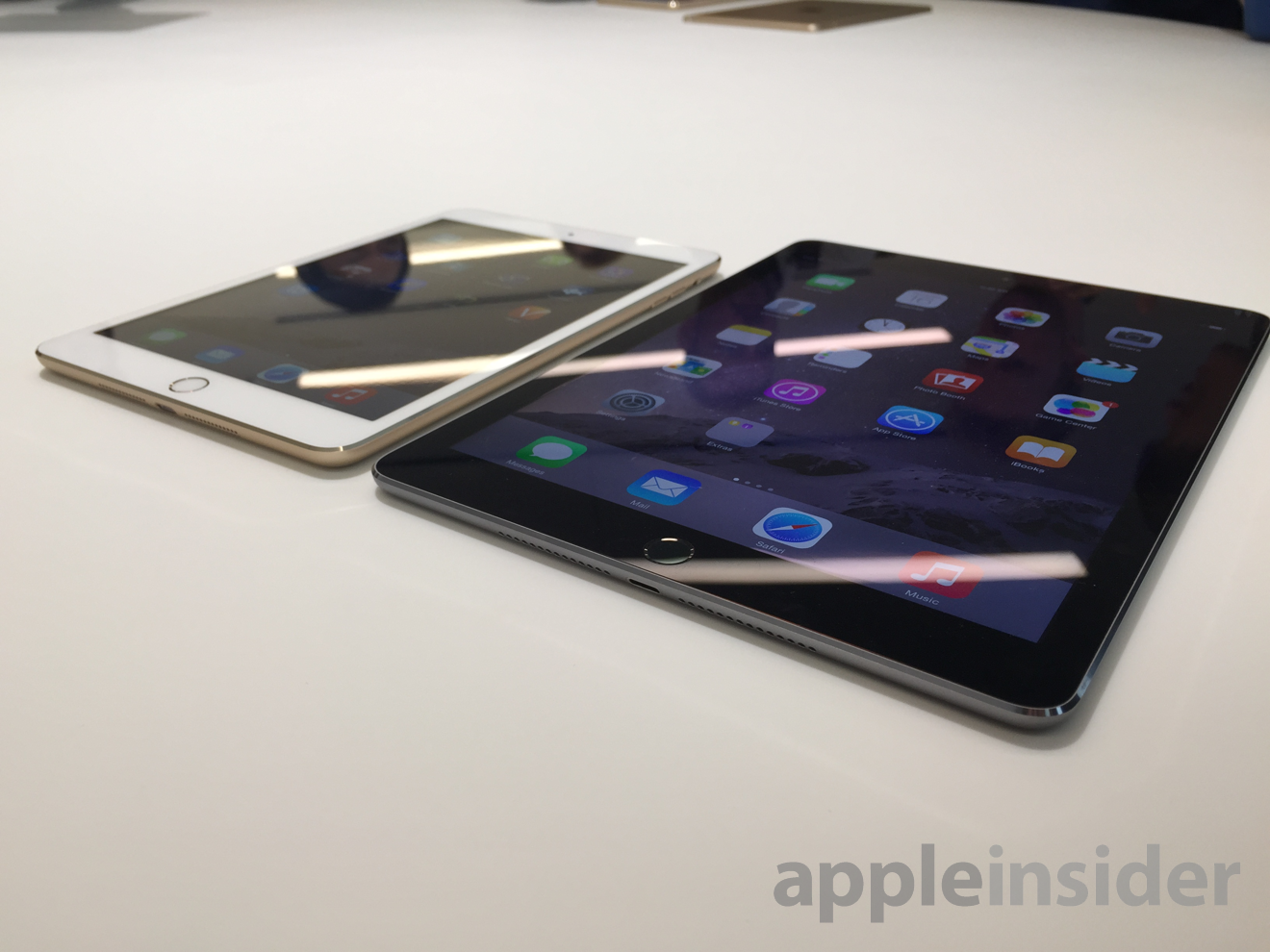
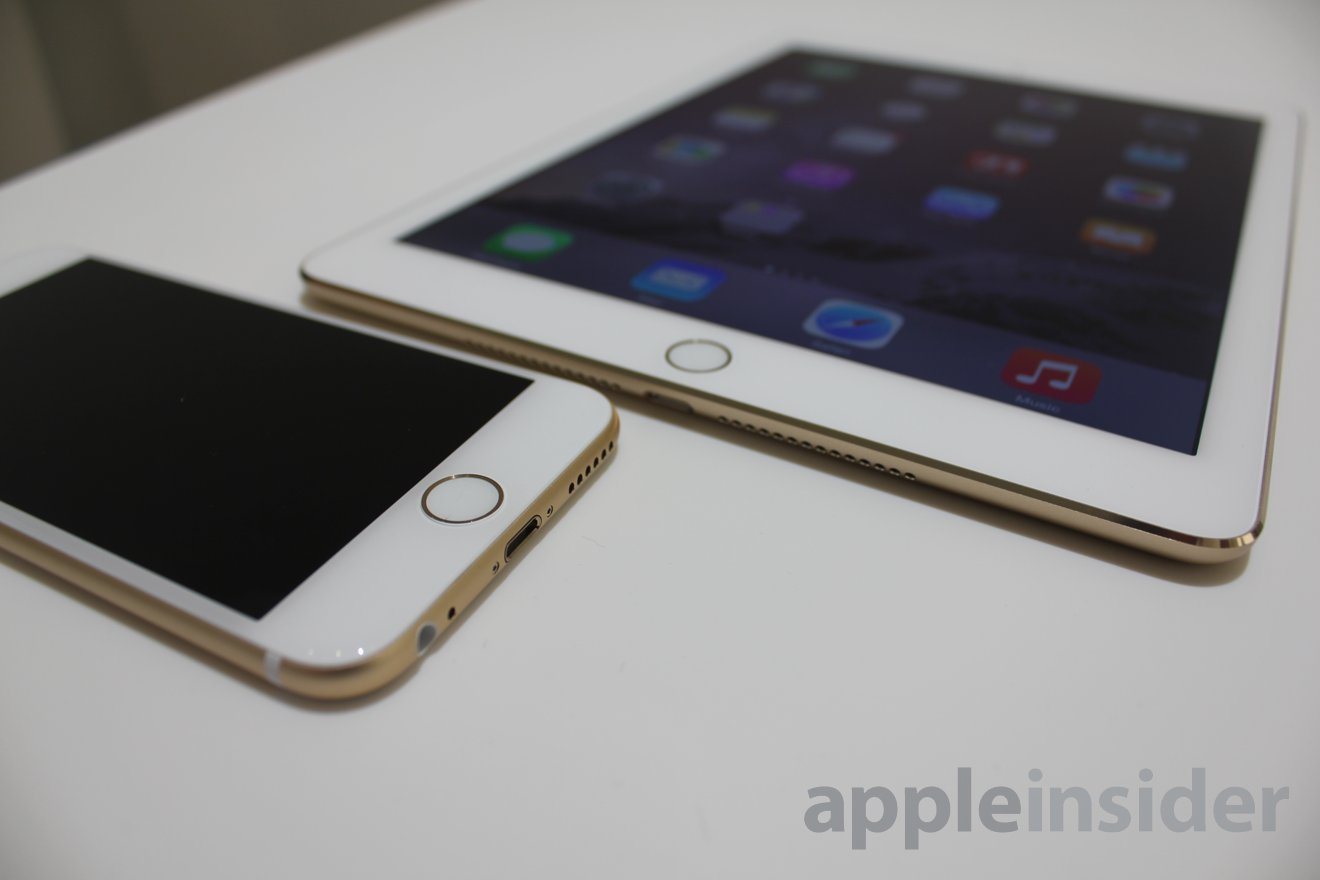
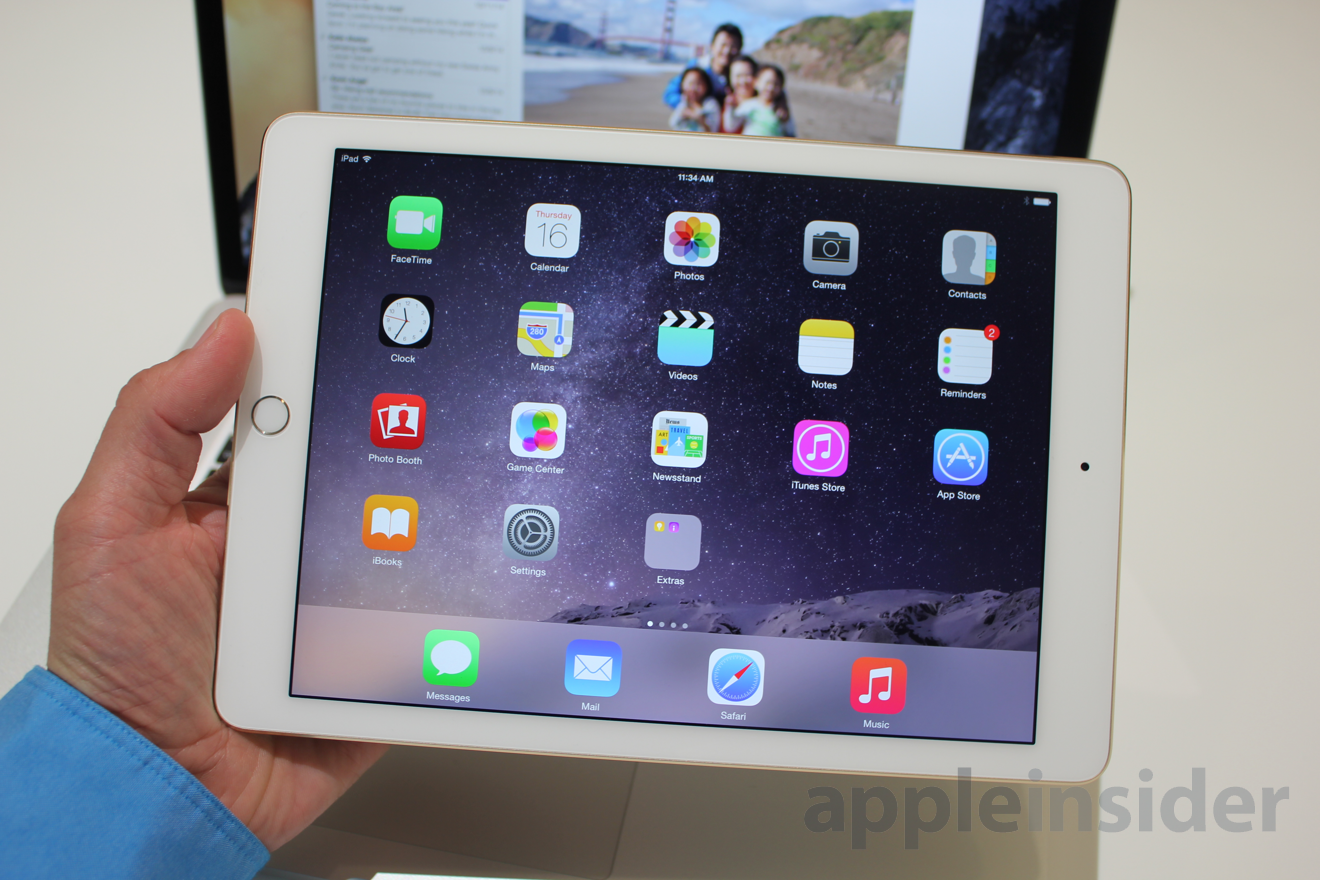
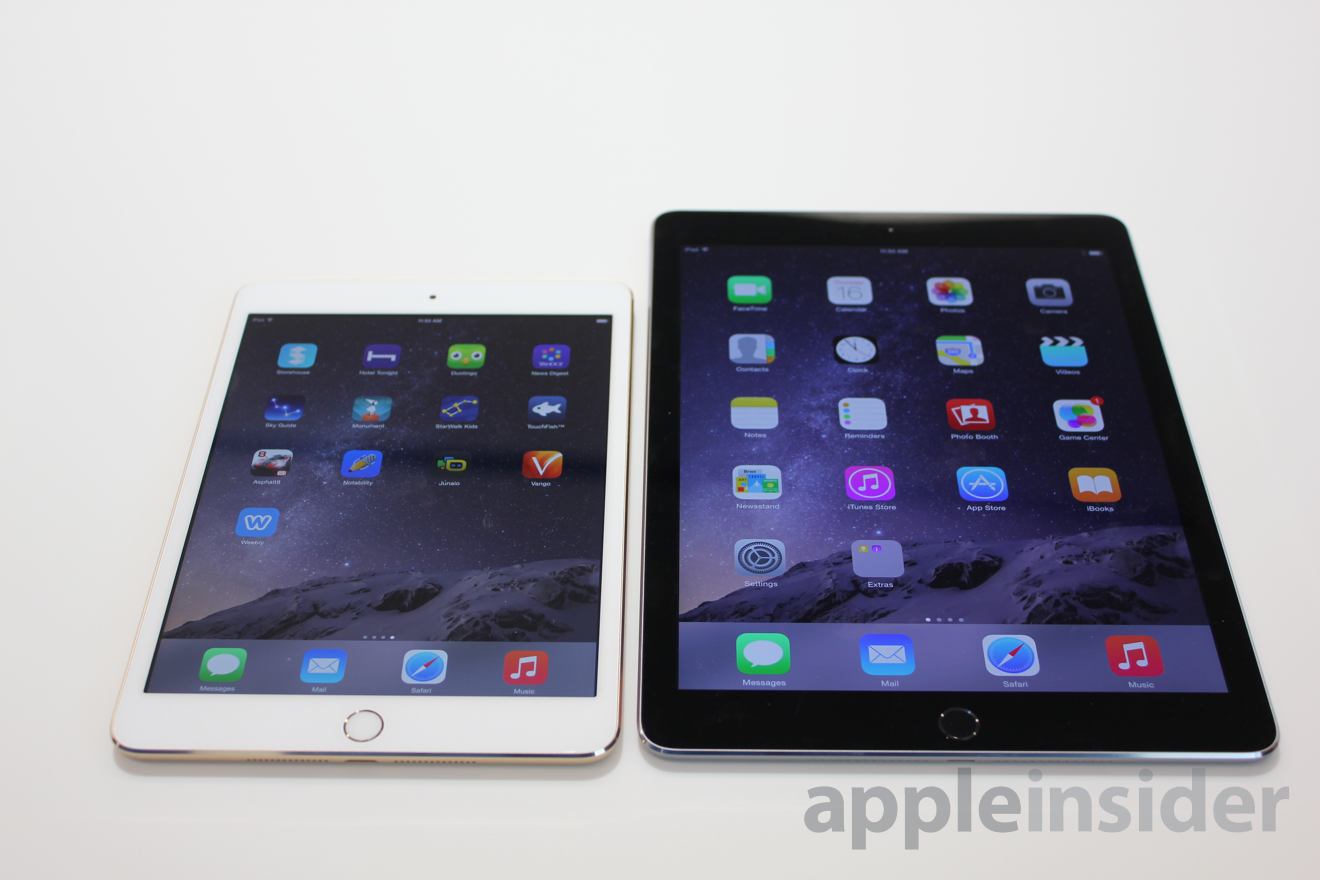
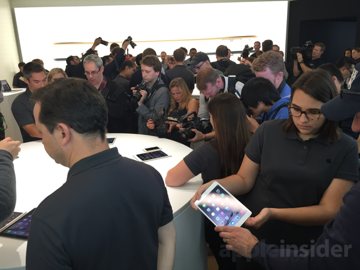

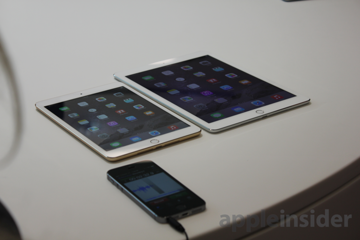
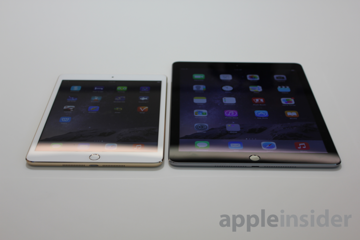







-m.jpg)






 Wesley Hilliard
Wesley Hilliard
 Malcolm Owen
Malcolm Owen
 Andrew Orr
Andrew Orr
 William Gallagher
William Gallagher
 Sponsored Content
Sponsored Content
 Christine McKee
Christine McKee

 Thomas Sibilly
Thomas Sibilly
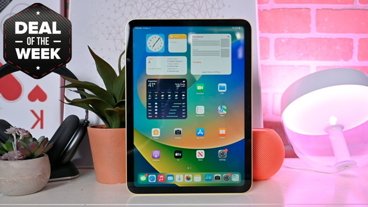
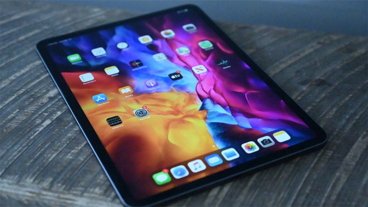





73 Comments
He mentioned specifically ApplePay wouldn't work for Point of Sale, just web purchases. Seems that would be a good business to dominate with ApplePay rolling out. Wonder if NFC readers will be made available that POS systems based on the iPad can take advantage of.
That first picture shows that 56% less glare is still a lot of glare (at least from that angle. Personally, indoors I never find the glare to be an issue).
My first thought during today's event: "Touch ID on iPad is a marginal feature. More people bring their iPhones with them when they're shopping, so Apple Pay is really an iPhone 6 / 6 Plus thing. Oh well. More iPad users will have better security, which is fine." My second though was "Oh wait. Apple Pay will make online shopping vastly easier and vastly more secure than it ever was. Online shopping via iPad will jump massively after October 20th (as well as from iPhone 6 / 6 Plus)." My third though was "Best Buy doesn't support Apple Pay because they know that easy, secure, private online mobile payment will help to speed up the decline of legacy brick-and-mortar stores such as theirs. They're just trying to delay the inevitable." And one final note: Best Buy is already on the decline. Partly because of Amazon. But even before Amazon, for one reason or another, few big-box chain retailers can last more than a generation. There have been umpteen failed attempts (Federated, Circuit City, The Good Guys, Pacific Stereo, etc.) But they all hit the wall after a few decades. Or less. JCPenny comes immediately to mind. They're teetering on the brink. Is it because they become "your dad's retailer"? Is it because newer big-box chain retailers can magically get better deals and enjoy higher margins? Is it because the name just gets old? Is it because technology changes and the retailers are stuck with old stock (e.g. old CD players vs. newer PMPs)? All of the above? I have no idea.
He mentioned specifically ApplePay wouldn't work for Point of Sale, just web purchases. Seems that would be a good business to dominate with ApplePay rolling out. Wonder if NFC readers will be made available that POS systems based on the iPad can take advantage of.
NFC reader would work as POS terminal, not on the device because the banks don't cover that.
My first thought during today's event: "Touch ID on iPad is a marginal feature. More people bring their iPhones with them when they're shopping, so Apple Pay is really an iPhone 6 / 6 Plus thing. Oh well. More iPad users will have better security, which is fine."
My second though was "Oh wait. Apple Pay will make online shopping vastly easier and vastly more secure than it ever was. Online shopping via iPad will jump massively after October 20th (as well as from iPhone 6 / 6 Plus)."
My third though was "Best Buy doesn't support Apple Pay because they know that easy, secure, private online mobile payment will help to speed up the decline of legacy brick-and-mortar stores such as theirs. They're just trying to delay the inevitable."
And one final note: Best Buy is already on the decline. Partly because of Amazon. But even before Amazon, for one reason or another, few big-box chain retailers can last more than a generation. There have been umpteen failed attempts (Federated, Circuit City, The Good Guys, Pacific Stereo, etc.) But they all hit the wall after a few decades. Or less.
JCPenny comes immediately to mind. They're teetering on the brink. Is it because they become "your dad's retailer"? Is it because newer big-box chain retailers can magically get better deals and enjoy higher margins? Is it because the name just gets old? Is it because technology changes and the retailers are stuck with old stock (e.g. old CD players vs. newer PMPs)? All of the above? I have no idea.
Points are valid. F Best Buy and Walmart...lol